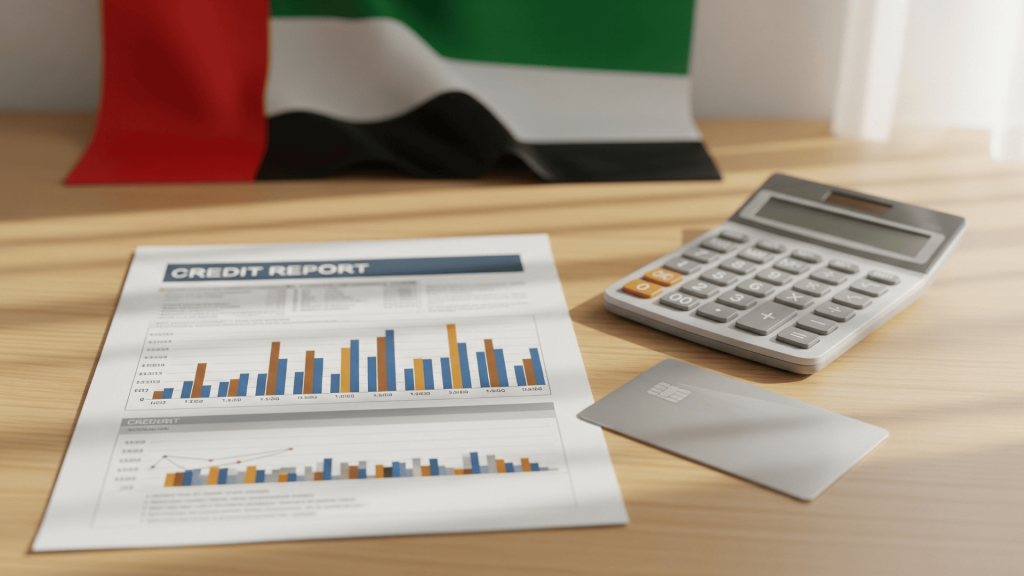In the UAE, your credit score is more than just a number; it’s a powerful financial tool.
It determines how lenders view your borrowing behavior and can directly impact your access to credit cards, loans, and financing options.
Understanding how your score works helps you make better financial decisions and unlocks more opportunities.
What is a Credit Score and How is it Calculated in the UAE?
A credit score in the UAE is a three-digit number (300–900) issued by the Al Etihad Credit Bureau (AECB) to assess your creditworthiness.
It is mainly calculated based on your payment history, credit utilization, the length and variety of your credit history, and recent credit inquiries, factors that lenders use to determine your eligibility for loans, credit cards, mortgages, and even rentals.
To check your credit score, simply visit the official AECB website or download the AECB CreditReport app, and request your credit report for a small fee (about AED 10.50). You do not need to calculate your score yourself; the AECB generates it automatically using your financial data.
A higher score improves your chances of getting approved for financial products with favorable terms.
Why Credit Score Matters for Credit Card Approval
Your credit score influences how easily you can get a credit card and what benefits come with it. A strong score not only improves approval chances but can also lead to better terms, higher limits, and more perks. Here’s how:
- Determines Approval Chances: A high score boosts your odds of approval, while a low score often results in rejections.
- Influences on Interest Rates: Better scores qualify for lower interest rates; poor scores often attract higher ones.
- Affects Credit Limits: High scores may get you larger credit limits; low scores can restrict your spending power.
- Impacts Processing Speed: Good scores often lead to faster, smoother approval processes with fewer document requests.
- Unlocks Premium Cards & Perks: Premium cards with rewards, cashback, or travel benefits often require high credit scores.
As shown above, your credit score affects more than just approval; it shapes your entire credit card experience.
Minimum Credit Score Required for Popular UAE Banks
Banks in the UAE have different thresholds when evaluating credit card applications. Knowing these requirements can help you prepare your finances before applying.
| BANK NAME | MINIMUM CREDIT SCORE REQUIRED | NOTES/ELIGIBILITY CRITERIA |
|---|---|---|
| Emirates NBD | 700+ | Standard cards need good scores; premium options require higher scores. |
| Emirates Islamic | 700+ | Scores below 400 are generally declined for all card types. |
| Citibank | 680–700 | Salary requirement of AED 8,000 or more often applies. |
| ADCB | 700+ | Competitive offers and faster approvals for high scores. |
| General UAE Banks | 650–700 | Below 650 is considered poor; 700 and above is typically good. |
Use the table above as a benchmark before applying for a card. It can help you target the right banks based on your credit standing.
How to Improve Your Credit Score in the UAE
Improving your score is possible with steady financial habits. These actions can help raise your number over time:
- Check your credit report for inaccuracies and update incorrect information.
- Pay bills and credit dues on time. Payment history is the most important factor.
- Keep your credit utilization ratio under 30% to show responsible credit use.
- Avoid applying for multiple credit cards or loans in a short time frame.
- Keep older credit cards open to maintain a long credit history.
- Maintain a healthy credit mix with both credit cards and installment loans.
- Regularly monitor your score through AECB to track improvements and stay informed.
Following the tips above consistently can lead to gradual yet impactful improvements in your credit score.
Need Help Improving Your Credit Score?
At Menaherald, our specialists in credit advisory services are tailored to meet the needs of UAE residents. Our experts can guide you with personalized strategies to boost your score.
What to Do if Your Credit Score is Low
A low credit score isn’t permanent; it can be improved with action and patience. Start by fixing any mistakes in your credit report. Then, focus on timely payments, reducing existing debts, and limiting new credit applications.
Using a secured credit card responsibly can also help build a positive track record. Stay disciplined, avoid financial overreach, and watch your score improve over time.
Myths About Credit Scores and Credit Cards in the UAE
There are many misunderstandings surrounding credit scores in the UAE. For starters, checking your own score doesn’t lower it; that’s a soft inquiry.
Your income doesn’t directly affect your score; it’s your payment behavior that matters. Closing old cards may reduce your score due to a shortened credit history.
And finally, credit scores may vary across bureaus based on data sources and models; there’s no single “true” score.
The Bottom Frame
Your credit score is one of the most powerful tools in your financial toolkit. It affects whether you qualify for credit cards, how much interest you’ll pay, and what benefits you can access.
By understanding how your score is calculated, why it matters, and how to improve it, you can make smarter decisions that lead to greater financial freedom and better borrowing options in the UAE.
Take Control of Your Financial Future. Don’t let a low credit score hold you back.
Frequently Asked Questions
How To Get a Credit Card In the UAE With a Low Credit Score?
Getting a credit card in the UAE is not possible if your credit score is low or if your monthly salary is less than AED 5,000. Even if your salary goes up later, you will still be denied a credit card if your credit score doesn’t improve. Banks in the UAE check both your income and your credit score before approval.
What Is A Good CIBIL Score In the UAE?
In the UAE, a credit score above 700 is considered good and improves your chances of getting a credit card or loan. If your score is below 400, approval becomes very difficult. These scores are calculated by the Al Etihad Credit Bureau (AECB) and are widely used by banks and lenders across the country.
What’s The Lowest Credit Score To Get A Credit Card?
You might still get approved for a credit card with a score below 560, but choices will be limited. Most of these will be secured cards, which often come with fewer perks and higher fees. To qualify for better options like rewards or cash-back cards, you’ll generally need a credit score of 660 or higher.


